Piano Sheet Music
 "... one thing people always ask me is 'How do you play outside?' ... I have no idea how to teach that, but when I was discussing this with our bass player Jesse Murphy, he said 'tell them to go cliff diving'... In other words, when you're jamming, you have to take risks if you want to find new sounds..." John Scofield
"... one thing people always ask me is 'How do you play outside?' ... I have no idea how to teach that, but when I was discussing this with our bass player Jesse Murphy, he said 'tell them to go cliff diving'... In other words, when you're jamming, you have to take risks if you want to find new sounds..." John Scofield
Traditional

Jay Chou
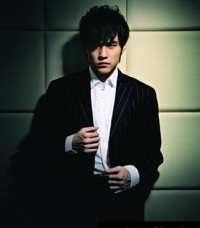
Jay Chou (traditional Chinese: 周杰倫; simplified Chinese: 周杰伦; pinyin: Zhōu Jiélún; Wade-Giles: Chou Chieh-lun; Pe̍h-ōe-jī: Chiu Kia̍t-lûn) (born January 18, 1979) is a Taiwanese musician, singer, producer, actor and director who has won the World Music Award four times. He is well-known for composing all his own songs and songs for other singers. In 1998 he was discovered in a talent contest where he displayed his piano and song-writing skills. Over the next two years, he was hired to compose for popular Chinese singers. Although he was trained in classical music, Chou combines Chinese and Western music styles to produce songs that fuse R&B, rock and pop genres, covering issues such as domestic violence, war, and urbanization.
In 2000 Chou released his first album, titled Jay, under the record company Alfa Music. Since then he has released one album per year, selling several million copies each. His music has gained recognition throughout Asia, most notably in regions such as Taiwan, China, Hong Kong, Japan, Malaysia, Indonesia, Singapore, Thailand, Vietnam and in overseas Asian communities, winning more than 20 awards each year. He has sold over 25 million albums worldwide. He debuted his acting career in Initial D (2005), for which he won Best Newcomer Actor in Golden Horse Awards, and was nominated for Best Supporting Actor by Hong Kong Film Awards for his role in Curse of the Golden Flower (2006). His career now extends into directing and running his own record company JVR Music. He has also endorsed various models of Media Players released by Onda in which he appears on the box, and his signature and likeness is printed on the back of certain models of these players.
In 2000 Chou released his first album, titled Jay, under the record company Alfa Music. Since then he has released one album per year, selling several million copies each. His music has gained recognition throughout Asia, most notably in regions such as Taiwan, China, Hong Kong, Japan, Malaysia, Indonesia, Singapore, Thailand, Vietnam and in overseas Asian communities, winning more than 20 awards each year. He has sold over 25 million albums worldwide. He debuted his acting career in Initial D (2005), for which he won Best Newcomer Actor in Golden Horse Awards, and was nominated for Best Supporting Actor by Hong Kong Film Awards for his role in Curse of the Golden Flower (2006). His career now extends into directing and running his own record company JVR Music. He has also endorsed various models of Media Players released by Onda in which he appears on the box, and his signature and likeness is printed on the back of certain models of these players.
Guiseppe Verdi

Giuseppe Fortunino Francesco Verdi (Italian pronunciation: ; 10 October 1813 – 27 January 1901) was an Italian Romantic composer, mainly of opera. He was one of the most influential composers of the 19th century. His works are frequently performed in opera houses throughout the world and, transcending the boundaries of the genre, some of his themes have long since taken root in popular culture - such as "La donna è mobile" from Rigoletto, "Va, pensiero" (The Chorus of the Hebrew Slaves) from Nabucco, "Libiamo ne' lieti calici" (The Drinking Song) from La traviata and the "Grand March" from Aida. Although his work was sometimes criticized for using a generally diatonic rather than a chromatic musical idiom and having a tendency toward melodrama, Verdi’s masterworks dominate the standard repertoire a century and a half after their composition.
Verdi's predecessors who influenced his music were Rossini, Bellini, Giacomo Meyerbeer and, most notably, Gaetano Donizetti and Saverio Mercadante. With the exception of Otello and Aida, he was free of Wagner's influence. Although respectful of Gounod, Verdi was careful not to learn anything from the Frenchman whom many of Verdi's contemporaries regarded as the greatest living composer. Some strains in Aida suggest at least a superficial familiarity with the works of the Russian composer Mikhail Glinka, whom Franz Liszt, after his tour of the Russian Empire as a pianist, popularized in Western Europe.
Throughout his career, Verdi rarely utilised the high C in his tenor arias, citing the fact that the opportunity to sing that particular note in front of an audience distracts the performer before and after the note appears. However, he did provide high Cs to Duprez in Jérusalem and to Tamberlick in the original version of La forza del destino. The high C often heard in the aria Di quella pira does not appear in Verdi's score.
Verdi's predecessors who influenced his music were Rossini, Bellini, Giacomo Meyerbeer and, most notably, Gaetano Donizetti and Saverio Mercadante. With the exception of Otello and Aida, he was free of Wagner's influence. Although respectful of Gounod, Verdi was careful not to learn anything from the Frenchman whom many of Verdi's contemporaries regarded as the greatest living composer. Some strains in Aida suggest at least a superficial familiarity with the works of the Russian composer Mikhail Glinka, whom Franz Liszt, after his tour of the Russian Empire as a pianist, popularized in Western Europe.
Throughout his career, Verdi rarely utilised the high C in his tenor arias, citing the fact that the opportunity to sing that particular note in front of an audience distracts the performer before and after the note appears. However, he did provide high Cs to Duprez in Jérusalem and to Tamberlick in the original version of La forza del destino. The high C often heard in the aria Di quella pira does not appear in Verdi's score.
Rachmaninoff

Sergei Vasilievich Rachmaninoff (1 April 1873 - 28 March 1943) was a Russian composer, pianist, and conductor. He was one of the finest pianists of his day and, as a composer, the last great representative of Russian late Romanticism in classical music. Early influences of Tchaikovsky, Rimsky-Korsakov and other Russian composers gave way to a thoroughly personal idiom which included a pronounced lyricism, expressive breadth, structural ingenuity and a tonal palette of rich, distinctive orchestral colors.
Understandably, the piano figures prominently in Rachmaninoff's compositional output, either as a solo instrument or as part of an ensemble. He made it a point, however, to use his own skills as a performer to explore fully the expressive possibilities of the instrument. Even in his earliest works, he revealed a sure grasp of idiomatic piano writing and a striking gift for melody. In some of his early orchestral pieces he showed the first signs of a talent for tone painting, which he would perfect in The Isle of the Dead, and he began to show a similar penchant for vocal writing in two early sets of songs, Opp. 4 and 8. Rachmaninoff's masterpiece, however, is his choral symphony The Bells, in which all of his talents are fused and unified.
Rachmaninoff sometimes felt threatened by the success of modernists such as Scriabin and Prokofiev and wondered whether to cease composing even before he left Russia. His musical philosophy was rooted in the Russian spiritual tradition, where the role of the artist was to create beauty and to speak the truth from the depths of his heart. In his last major interview, in 1941, he admitted his music, like Russian music, was a product of his temperament. He said, on another occasion, "The new kind of music seems to create not from the heart but from the head. Its composers think rather than feel. They have not the capacity to make their works exalt—they meditate, protest, analyze, reason, calculate and brood, but they do not exalt."
Understandably, the piano figures prominently in Rachmaninoff's compositional output, either as a solo instrument or as part of an ensemble. He made it a point, however, to use his own skills as a performer to explore fully the expressive possibilities of the instrument. Even in his earliest works, he revealed a sure grasp of idiomatic piano writing and a striking gift for melody. In some of his early orchestral pieces he showed the first signs of a talent for tone painting, which he would perfect in The Isle of the Dead, and he began to show a similar penchant for vocal writing in two early sets of songs, Opp. 4 and 8. Rachmaninoff's masterpiece, however, is his choral symphony The Bells, in which all of his talents are fused and unified.
Rachmaninoff sometimes felt threatened by the success of modernists such as Scriabin and Prokofiev and wondered whether to cease composing even before he left Russia. His musical philosophy was rooted in the Russian spiritual tradition, where the role of the artist was to create beauty and to speak the truth from the depths of his heart. In his last major interview, in 1941, he admitted his music, like Russian music, was a product of his temperament. He said, on another occasion, "The new kind of music seems to create not from the heart but from the head. Its composers think rather than feel. They have not the capacity to make their works exalt—they meditate, protest, analyze, reason, calculate and brood, but they do not exalt."
Bon Jovi
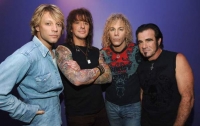
Bon Jovi is a rock band from Sayreville, New Jersey. Fronted by lead singer and namesake Jon Bongiovi, the group originally achieved large-scale success in the 1980s. Over the past 25 years, Bon Jovi has sold over 120 million albums worldwide, including 34 million in the United States alone.
Bon Jovi formed in 1983 with lead singer Jon Bon Jovi, guitarist Richie Sambora, keyboardist David Bryan, bassist Alec John Such, and drummer Tico Torres. Other than the departure of Alec John Such in 1994 (which pared the lineup down to a quartet), the lineup has remained the same for the past 25 years. After two moderately successful albums in 1984 and 1985, the band scored big with Slippery When Wet (1986) and New Jersey (1988), which sold a combined 19 million copies in the U.S. alone, charted eight Top Ten hits (including four number one hits), and launched the band into global super stardom. After non-stop touring, the band went on hiatus after the New Jersey Tour in 1990, during which time Jon Bon Jovi and Richie Sambora both released successful solo albums. In 1992, the band returned with the double platinum Keep the Faith and has since created a string of platinum albums throughout the 1990s and 2000s.
In 2006, the band won a Grammy for best Country Collaboration for "Who Says You Can't Go Home" with Jennifer Nettles from Sugarland and also became the first rock band to reach #1 on the Hot Country Songs chart with the same song. The band has also received multiple Grammy nominations for music from the albums Crush, Bounce, and Lost Highway.
Throughout their career, the band has released ten studio albums, of which nine have gone platinum. In addition, the band has charted 19 singles to the Top 40 of the Billboard Hot 100, four of which reached #1 ("You Give Love a Bad Name", "Livin' on a Prayer", "Bad Medicine", and "I'll Be There for You"). The band also holds the record for the most weeks for a hard rock album at #1 on the Billboard 200 with Slippery When Wet, as well as the most Top 10 singles from a hard rock album, with New Jersey, which charted five such singles.
Bon Jovi formed in 1983 with lead singer Jon Bon Jovi, guitarist Richie Sambora, keyboardist David Bryan, bassist Alec John Such, and drummer Tico Torres. Other than the departure of Alec John Such in 1994 (which pared the lineup down to a quartet), the lineup has remained the same for the past 25 years. After two moderately successful albums in 1984 and 1985, the band scored big with Slippery When Wet (1986) and New Jersey (1988), which sold a combined 19 million copies in the U.S. alone, charted eight Top Ten hits (including four number one hits), and launched the band into global super stardom. After non-stop touring, the band went on hiatus after the New Jersey Tour in 1990, during which time Jon Bon Jovi and Richie Sambora both released successful solo albums. In 1992, the band returned with the double platinum Keep the Faith and has since created a string of platinum albums throughout the 1990s and 2000s.
In 2006, the band won a Grammy for best Country Collaboration for "Who Says You Can't Go Home" with Jennifer Nettles from Sugarland and also became the first rock band to reach #1 on the Hot Country Songs chart with the same song. The band has also received multiple Grammy nominations for music from the albums Crush, Bounce, and Lost Highway.
Throughout their career, the band has released ten studio albums, of which nine have gone platinum. In addition, the band has charted 19 singles to the Top 40 of the Billboard Hot 100, four of which reached #1 ("You Give Love a Bad Name", "Livin' on a Prayer", "Bad Medicine", and "I'll Be There for You"). The band also holds the record for the most weeks for a hard rock album at #1 on the Billboard 200 with Slippery When Wet, as well as the most Top 10 singles from a hard rock album, with New Jersey, which charted five such singles.
Rossini

Gioachino Antonio Rossini (February 29, 1792 – November 13, 1868) was a popular Italian composer who created 39 operas as well as sacred music and chamber music. His best known works include Il barbiere di Siviglia (The Barber of Seville), La Cenerentola and Guillaume Tell (William Tell).
Rossini's most famous opera was produced on February 20, 1816 at the Teatro Argentina in Rome. The libretto by Cesare Sterbini, a version of Pierre Beaumarchais' infamous stage play Le Barbier de Séville, was the same as that already used by Giovanni Paisiello in his own Barbiere, an opera which had enjoyed European popularity for more than a quarter of a century. Much is made of how fast Rossini's opera was written, scholarship generally agreeing upon two weeks. Later in life, Rossini claimed to have written the opera in only twelve days. It was a colossal failure when it premiered as Almaviva; Paisiello’s admirers were extremely indignant, sabotaging the production by whistling and shouting during the entire first act. However, not long after the second performance, the opera became so successful that the fame of Paisiello's opera was transferred to Rossini's, to which the title The Barber of Seville passed as an inalienable heritage.
Rossini's most famous opera was produced on February 20, 1816 at the Teatro Argentina in Rome. The libretto by Cesare Sterbini, a version of Pierre Beaumarchais' infamous stage play Le Barbier de Séville, was the same as that already used by Giovanni Paisiello in his own Barbiere, an opera which had enjoyed European popularity for more than a quarter of a century. Much is made of how fast Rossini's opera was written, scholarship generally agreeing upon two weeks. Later in life, Rossini claimed to have written the opera in only twelve days. It was a colossal failure when it premiered as Almaviva; Paisiello’s admirers were extremely indignant, sabotaging the production by whistling and shouting during the entire first act. However, not long after the second performance, the opera became so successful that the fame of Paisiello's opera was transferred to Rossini's, to which the title The Barber of Seville passed as an inalienable heritage.
Toots Thielemans
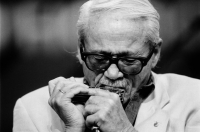
Jean-Baptiste Frédéric Isidor, Baron Thielemans (29 April 1922 – 22 August 2016), known professionally as Toots Thielemans, was a Belgian jazz musician. He was known for his harmonica playing, as well as his guitar, whistling skills, and composing. According to jazz historian Ted Gioia, his most important contribution was in "championing the humble harmonica", which Thielemans made into a "legitimate voice in jazz". He eventually became the "preeminent" jazz harmonica player.
John Philip Sousa

John Philip Sousa (November 6, 1854 – March 6, 1932) was an American composer and conductor of the late Romantic era known particularly for American military and patriotic marches. Because of his mastery of march composition and resultant prominence, he is known as "The March King". In public he was typically referenced by his full name.
Purcell

Henry Purcell (pronounced /ˈpɜrsəl/; 10 September 1659 (?) – 21 November 1695), was an English organist and Baroque composer of secular and sacred music. Although Purcell incorporated Italian and French stylistic elements into his compositions, his legacy was a uniquely English form of Baroque music.
Bruno Brun
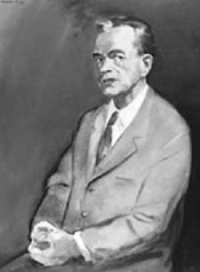
Bruno Brun (1910–1978) was a Yugoslav clarinetist and professor at the Belgrade Music Academy.As a soloist, Brun had performed throughout Yugoslavia as well as abroad. He also performed as a principal clarinetist with the Belgrade Philharmonic Orchestra and Belgrade Opera.He was one of the founders of the Association of Musical Artists of Serbia and its vice-president, and the secretary of the Belgrade Philharmonic Orchestra.He was awarded "7 July" Prize (1969), the highest state prize for the arts, as well as Decoration of Work.
Remo Vinciguerra
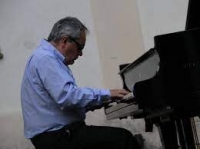
Remo Vinciguerra Musical artist Fantastic Gran Piano · 2011 I tramonti di Roma Binario 21 · 2016
Patsy Cline
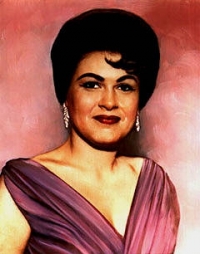
Patsy Cline (September 8, 1932–March 5, 1963), born Virginia Patterson Hensley, was an American country music singer who enjoyed pop music crossover success during the era of the Nashville sound in the early 1960s. Since her death at age 30 in a 1963 private airplane crash at the height of her career, she has been considered one of the most influential, successful and acclaimed female vocalists of the 20th century.
Cline was best known for her rich tone and emotionally expressive bold contralto voice, which, along with her role as a mover and shaker in the country music industry, has been cited as an inspiration by many vocalists of various music genres. Her life and career have been the subject of numerous books, movies, documentaries, articles and stage plays.
Her hits included "Walkin' After Midnight", "I Fall to Pieces", "She's Got You", "Crazy" and "Sweet Dreams". Posthumously, millions of her albums have been sold over the past 46 years and she has been given numerous awards, which have given her an iconic status with some fans similar to that of legends Johnny Cash and Elvis Presley. Ten years after her death, she became the first female solo artist inducted to the Country Music Hall of Fame.
In 2002, Cline was voted by artists and members of the country music industry as number one on CMT's television special, The 40 Greatest Women of Country Music, and in 1999 she was voted number 11 on VH1's special The 100 Greatest Women in Rock and Roll by members and artists of the rock industry. According to her 1973 Country Music Hall of Fame plaque, "Her heritage of timeless recordings is testimony to her artistic capacity."
Cline was best known for her rich tone and emotionally expressive bold contralto voice, which, along with her role as a mover and shaker in the country music industry, has been cited as an inspiration by many vocalists of various music genres. Her life and career have been the subject of numerous books, movies, documentaries, articles and stage plays.
Her hits included "Walkin' After Midnight", "I Fall to Pieces", "She's Got You", "Crazy" and "Sweet Dreams". Posthumously, millions of her albums have been sold over the past 46 years and she has been given numerous awards, which have given her an iconic status with some fans similar to that of legends Johnny Cash and Elvis Presley. Ten years after her death, she became the first female solo artist inducted to the Country Music Hall of Fame.
In 2002, Cline was voted by artists and members of the country music industry as number one on CMT's television special, The 40 Greatest Women of Country Music, and in 1999 she was voted number 11 on VH1's special The 100 Greatest Women in Rock and Roll by members and artists of the rock industry. According to her 1973 Country Music Hall of Fame plaque, "Her heritage of timeless recordings is testimony to her artistic capacity."
Alexander Glazunov

Alexander Konstantinovich Glazunov (Russian: Алекса́ндр Константи́нович Глазуно́в, 10 August 1865 – 21 March 1936) was a Russian composer, music teacher, and conductor of the late Russian Romantic period. He served as director of the Saint Petersburg Conservatory between 1905 and 1928 and was instrumental in the reorganization of the institute into the Petrograd Conservatory, then the Leningrad Conservatory, following the Bolshevik Revolution. He continued heading the Conservatory until 1930, though he had left the Soviet Union in 1928 and did not return. The best-known student under his tenure during the early Soviet years was Dmitri Shostakovich.
Dragon Quest

Dragon Quest, previously published as Dragon Warrior in North America until 2005, is a franchise of Japanese role-playing video games created by Yuji Horii.
Henry Lefkowitch

Henry Lefkowitch Biography. Henry was a composer and publisher of Jewish music and founder of the Beethoven Orchestra. He was 67 (born 1892) when he died in ...
John Gardner

John Linton Gardner, CBE (2 March 1917 – 12 December 2011) was an English composer of classical music.John Gardner was born in Manchester, England and grew up in Ilfracombe, North Devon. His father Alfred Linton Gardner (born 1882, Ilfracombe died 10 April 1918, France) was a local physician and amateur composer who was killed in action in the First World War. His grandfather was John Twiname Gardner, also a general practitioner and composer. His mother, Emily Muriel Pullein-Thompson, was the sister of Captain Harold J "Cappy" Pullein-Thompson, who was the father of Josephine, Diana and Christine Pullein-Thompson and their brother, the playwright Denis Cannan.
Angelo Badalementi
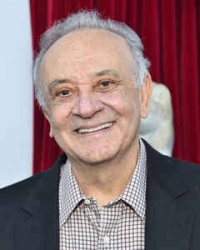
Angelo Badalamenti, American composer. He composed music for most of the productions directed by David Lynch.
Date of birth: March 22, 1937 (82 years old), Brooklyn, New York, United States Albums: Soundtrack from Twin Peaks, Music of Twin Peaks, Genres: Film score, Jazz, Ambient Music Awards: Grammy Best Pop Instrumental Performance Award, Education: Eastman School of Music, Manhattan School of Music
Date of birth: March 22, 1937 (82 years old), Brooklyn, New York, United States Albums: Soundtrack from Twin Peaks, Music of Twin Peaks, Genres: Film score, Jazz, Ambient Music Awards: Grammy Best Pop Instrumental Performance Award, Education: Eastman School of Music, Manhattan School of Music
The Fray
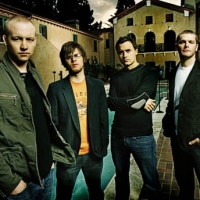
The Fray is a Grammy Award-nominated four-piece piano rock American band from Denver, Colorado. Formed in 2002 by schoolmates Isaac Slade and Joe King, the band released their debut album How to Save a Life in 2005. The band is best known for the song "How to Save a Life", which charted in the top three of the Billboard Hot 100 and was also a top 5 single in Canada, Australia, Ireland, Sweden, and the United Kingdom. The Fray also found national success with the song "Over My Head (Cable Car)", which became a top ten hit in the United States and Canada. How to Save a Life was certified double platinum by the Recording Industry Association of America and was also certified platinum in Australia and New Zealand.
The Fray was formed in 2002, and currently consists of Isaac Slade (vocals and piano), Joe King (guitar and vocals), Dave Welsh (guitar) and Ben Wysocki (drums and percussion). While the band has no official bass guitarist, Dan Lavery of Tonic has been the touring bassist since March 2007. Prior to Dan joining the touring fold, Jimmy Stofer, also a member of the band Hello Kavita, was employed as the band's touring bassist from 2005 through February 2007.
The Fray was formed in 2002, and currently consists of Isaac Slade (vocals and piano), Joe King (guitar and vocals), Dave Welsh (guitar) and Ben Wysocki (drums and percussion). While the band has no official bass guitarist, Dan Lavery of Tonic has been the touring bassist since March 2007. Prior to Dan joining the touring fold, Jimmy Stofer, also a member of the band Hello Kavita, was employed as the band's touring bassist from 2005 through February 2007.
Amy Rowe

Amy was born in southern California and grew up in Glendora, California. She began classical piano studies at age four under Akiko Hasunuma until age 18. For eleven consecutive years ('97-'07) her classical playing was in the honors category from the American College of Musicians National Piano Guild.
Charles-Valentin Alkan
Charles-Valentin Alkan (French: ; 30 November 1813 – 29 March 1888) was a French-Jewish composer and virtuoso pianist. At the height of his fame in the 1830s and 1840s he was, alongside his friends and colleagues Frédéric Chopin and Franz Liszt, among the leading pianists in Paris, a city in which he spent virtually his entire life.Alkan earned many awards at the Conservatoire de Paris, which he entered before he was six. His career in the salons and concert halls of Paris was marked by his occasional long withdrawals from public performance, for personal reasons. Although he had a wide circle of friends and acquaintances in the Parisian artistic world, including Eugène Delacroix and George Sand, from 1848 he began to adopt a reclusive life style, while continuing with his compositions – virtually all of which are for the keyboard.
François Couperin

François Couperin (French: ; 10 November 1668 – 11 September 1733) was a French Baroque composer, organist and harpsichordist. He was known as Couperin le Grand ("Couperin the Great") to distinguish him from other members of the musically talented Couperin family.Couperin was born into a prominent musical family. His father Charles was organist at the Church of Saint-Gervais in Paris, a position previously held by Charles's brother Louis Couperin, the esteemed keyboard virtuoso and composer whose career was cut short by an early death. As a boy François must have received his first music lessons from his father, but Charles died in 1679. The church council at Saint-Gervais hired Michel Richard Delalande to serve as new organist on the understanding that François would replace him at age 18.
Al Stewart
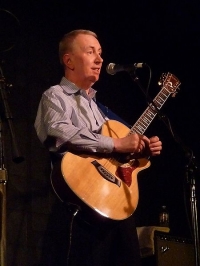
Al Stewart (born Alastair Ian Stewart, 5 September 1945) is a Scottish singer-songwriter and folk-rock musician.
Stewart came to stardom as part of the British folk revival in the '60s and '70s, and developed his own unique style of combining folk-rock songs with delicately woven tales of the great characters and events from history.
He is best known for his hit 1976 single "Year of the Cat" from the platinum album Year of the Cat.
Though Year of the Cat and its 1978 platinum follow-up Time Passages brought Stewart his biggest worldwide commercial successes, earlier albums such as Past, Present and Future from 1973 are often seen as better examples of his intimate brand of historical folk-rock - a style to which he has returned in recent albums.
Stewart was a key figure in a fertile era in British music and he appears throughout the musical folklore of the age. He played at the first ever Glastonbury Festival in 1970, knew Yoko Ono pre-Lennon, shared a London apartment with a young Paul Simon, and hosted at the legendary Les Cousins folk club in London in the 1960s.
Stewart has released eighteen studio/live albums and two limited edition albums of B-sides and rarities between Bedsitter Images in 1967 and Sparks of Ancient Light in 2008, and continues to tour extensively around the US and Canada, Europe and the UK. In 2009, he released Uncorked (Live with Dave Nachmanoff) on his independent label, Wallaby Trails Recordings.
He has worked with Alan Parsons, Jimmy Page, Rick Wakeman, Tori Amos and Tim Renwick and currently plays with Dave Nachmanoff and former Wings lead-guitarist Laurence Juber.
Stewart came to stardom as part of the British folk revival in the '60s and '70s, and developed his own unique style of combining folk-rock songs with delicately woven tales of the great characters and events from history.
He is best known for his hit 1976 single "Year of the Cat" from the platinum album Year of the Cat.
Though Year of the Cat and its 1978 platinum follow-up Time Passages brought Stewart his biggest worldwide commercial successes, earlier albums such as Past, Present and Future from 1973 are often seen as better examples of his intimate brand of historical folk-rock - a style to which he has returned in recent albums.
Stewart was a key figure in a fertile era in British music and he appears throughout the musical folklore of the age. He played at the first ever Glastonbury Festival in 1970, knew Yoko Ono pre-Lennon, shared a London apartment with a young Paul Simon, and hosted at the legendary Les Cousins folk club in London in the 1960s.
Stewart has released eighteen studio/live albums and two limited edition albums of B-sides and rarities between Bedsitter Images in 1967 and Sparks of Ancient Light in 2008, and continues to tour extensively around the US and Canada, Europe and the UK. In 2009, he released Uncorked (Live with Dave Nachmanoff) on his independent label, Wallaby Trails Recordings.
He has worked with Alan Parsons, Jimmy Page, Rick Wakeman, Tori Amos and Tim Renwick and currently plays with Dave Nachmanoff and former Wings lead-guitarist Laurence Juber.
Liszt

Franz Liszt (October 22, 1811 – July 31, 1886) was a Hungarian composer, virtuoso pianist and teacher.
Liszt became renowned throughout Europe for his great skill as a performer; to this day, many consider him to have been the greatest pianist in history. He was also an important and influential composer, a notable piano teacher, a conductor who contributed significantly to the modern development of the art, and a benefactor to other composers and performers, notably Richard Wagner and Hector Berlioz.
As a composer, Liszt was one of the most prominent representatives of the "Neudeutsche Schule" ("New German School"). He left behind a huge and diverse oeuvre, in which he influenced his forward-looking contemporaries and anticipated some 20th-century ideas and trends. Some of his most notable contributions were the invention of the symphonic poem, developing the concept of thematic transformation as part of his experiments in musical form and making radical departures in harmony.
Liszt has most frequently been credited to have been the first pianist who gave concerts with programs consisting only of solo pieces. An example is a concert he gave on March 9, 1839, at the Palazzo Poli in Rome. Since Liszt could not find singers who — following the usual habit of the time — should have completed the program, he played four numbers all alone.
Liszt was a prolific composer. Most of his music is for the piano and much of it requires formidable technique.In his most famous and virtuosic works, he is the archetypal Romantic composer. Liszt pioneered the technique of thematic transformation, a method of development which was related to both the existing variation technique and to the new use of the Leitmotif by Richard Wagner. Liszt's piano works are usually divided into two classes. On the one hand, there are "original works", and on the other hand "transcriptions", "paraphrases" or "fantasies" on works by other composers.
Liszt became renowned throughout Europe for his great skill as a performer; to this day, many consider him to have been the greatest pianist in history. He was also an important and influential composer, a notable piano teacher, a conductor who contributed significantly to the modern development of the art, and a benefactor to other composers and performers, notably Richard Wagner and Hector Berlioz.
As a composer, Liszt was one of the most prominent representatives of the "Neudeutsche Schule" ("New German School"). He left behind a huge and diverse oeuvre, in which he influenced his forward-looking contemporaries and anticipated some 20th-century ideas and trends. Some of his most notable contributions were the invention of the symphonic poem, developing the concept of thematic transformation as part of his experiments in musical form and making radical departures in harmony.
Liszt has most frequently been credited to have been the first pianist who gave concerts with programs consisting only of solo pieces. An example is a concert he gave on March 9, 1839, at the Palazzo Poli in Rome. Since Liszt could not find singers who — following the usual habit of the time — should have completed the program, he played four numbers all alone.
Liszt was a prolific composer. Most of his music is for the piano and much of it requires formidable technique.In his most famous and virtuosic works, he is the archetypal Romantic composer. Liszt pioneered the technique of thematic transformation, a method of development which was related to both the existing variation technique and to the new use of the Leitmotif by Richard Wagner. Liszt's piano works are usually divided into two classes. On the one hand, there are "original works", and on the other hand "transcriptions", "paraphrases" or "fantasies" on works by other composers.
Paganini

Niccolò Paganini (27 October 1782 – 27 May 1840) was an Italian violinist, violist, guitarist, and composer. He was one of the most celebrated violin virtuosi of his time, and left his mark as one of the pillars of modern violin technique. His caprice in A minor, Op. 1 No. 24 is among his best known of compositions, and serves as inspiration for many prominent artists.
Paganini composed his own works to play exclusively in his concerts, all of which had profound influences on the evolution of violin techniques. His 24 Caprices were probably composed in the period between 1805 to 1809, while he was in the service of the Baciocchi court. Also during this period, he composed the majority of the solo pieces, duo-sonatas,trios and quartets for the guitar. These chamber works may have been inspired by the publication, in Lucca, of the guitar quintets of Boccherini. Many of his variations (and he has become the de facto master of this musical genre), including Le Streghe, The Carnival of Venice, and Nel cor più non mi sento, were composed, or at least first performed, before his European concert tour.
Playbill of Paganini's concert at the Covent Garden in 1832. Note that all solo pieces were of his composition, which was typical of all his concerts.
Generally speaking, Paganini's compositions were technically imaginative, and the timbre of the instrument was greatly expanded as a result of these works. Sounds of different musical instruments and animals were often imitated. One such composition was titled Il Fandango Spanolo (The Spanish Dance), which featured a series of humorous imitations of farm animals. Even more outrageous was a solo piece Duetto Amoroso, in which the sighs and groans of lovers were intimately depicted on the violin. Fortunately there survives a manuscript of the Duetto which has been recorded, while the existence of the Fandango is known only through concert posters.
However, his works were criticized for lacking characteristics of true polyphonism, as pointed out by Eugène Ysaÿe. Yehudi Menuhin, on the other hand, suggested that this might have been the result of his reliance on the guitar (in lieu of the piano) as an aid in composition. The orchestral parts for his concertos were often polite, unadventurous, and clearly supportive of the soloist. In this, his style is consistent with that of other Italian composers such as Paisiello, Rossini and Donizetti, who were influenced by the guitar-song milieu of Naples during this period.
Paganini was also the inspiration of many prominent composers. Both "La Campanella" and the A minor caprice (Nr. 24) have been an object of interest for a number of composers. Franz Liszt, Johannes Brahms, Sergei Rachmaninoff, Boris Blacher, Andrew Lloyd Webber, George Rochberg and Witold Lutosławski, among others, wrote well-known variations on these themes.
Paganini composed his own works to play exclusively in his concerts, all of which had profound influences on the evolution of violin techniques. His 24 Caprices were probably composed in the period between 1805 to 1809, while he was in the service of the Baciocchi court. Also during this period, he composed the majority of the solo pieces, duo-sonatas,trios and quartets for the guitar. These chamber works may have been inspired by the publication, in Lucca, of the guitar quintets of Boccherini. Many of his variations (and he has become the de facto master of this musical genre), including Le Streghe, The Carnival of Venice, and Nel cor più non mi sento, were composed, or at least first performed, before his European concert tour.
Playbill of Paganini's concert at the Covent Garden in 1832. Note that all solo pieces were of his composition, which was typical of all his concerts.
Generally speaking, Paganini's compositions were technically imaginative, and the timbre of the instrument was greatly expanded as a result of these works. Sounds of different musical instruments and animals were often imitated. One such composition was titled Il Fandango Spanolo (The Spanish Dance), which featured a series of humorous imitations of farm animals. Even more outrageous was a solo piece Duetto Amoroso, in which the sighs and groans of lovers were intimately depicted on the violin. Fortunately there survives a manuscript of the Duetto which has been recorded, while the existence of the Fandango is known only through concert posters.
However, his works were criticized for lacking characteristics of true polyphonism, as pointed out by Eugène Ysaÿe. Yehudi Menuhin, on the other hand, suggested that this might have been the result of his reliance on the guitar (in lieu of the piano) as an aid in composition. The orchestral parts for his concertos were often polite, unadventurous, and clearly supportive of the soloist. In this, his style is consistent with that of other Italian composers such as Paisiello, Rossini and Donizetti, who were influenced by the guitar-song milieu of Naples during this period.
Paganini was also the inspiration of many prominent composers. Both "La Campanella" and the A minor caprice (Nr. 24) have been an object of interest for a number of composers. Franz Liszt, Johannes Brahms, Sergei Rachmaninoff, Boris Blacher, Andrew Lloyd Webber, George Rochberg and Witold Lutosławski, among others, wrote well-known variations on these themes.
Branford marsalis

Branford Marsalis, D.Mus., American jazz saxophonist, composer. His professional career began in the early 1980s with Blakey's Jazz Messengers, Clark Terry and Art Blakey's big band. Between 1982-1985 he played in his brother Wynton's band. He then left to play on Sting's Backup Band
Astor Piazzolla

Ástor Pantaleón Piazzolla (March 11, 1921 – July 4, 1992) was an Argentine tango composer and bandoneón player. His oeuvre revolutionized the traditional tango into a new style termed nuevo tango, incorporating elements from jazz and classical music. An excellent bandoneonist, he regularly performed his own compositions with different ensembles.
Piazzolla's nuevo tango was distinct from the traditional tango in its incorporation of elements of jazz, its use of extended harmonies and dissonance, its use of counterpoint, and its ventures into extended compositional forms. As Argentine psychoanalyst Carlos Kuri has pointed out, Piazzolla's fusion of tango with this wide range of other recognizable Western musical elements was so successful that it produced a new individual style transcending these influences. It is precisely this success, and individuality, that makes it hard to pin down where particular influences reside in his compositions, but some aspects are clear. The use of the passacaglia technique of a circulating bass line and harmonic sequence, invented and much used in 17th and 18th century baroque music but also central to the idea of jazz "changes", predominates in most of Piazzolla's mature compositions. Another clear reference to the baroque is the often complex and virtuosic counterpoint that sometimes follows strict fugal behavior but more often simply allows each performer in the group to assert his voice. A further technique that emphasises this sense of democracy and freedom among the musicians is improvisation that is borrowed from jazz in concept, but in practice involves a different vocabulary of scales and rhythms that stay within the parameters of the established tango sound-world. Pablo Ziegler has been particularly responsible for developing this aspect of the style both within Piazzolla's groups and since the composer's death.
Piazzolla's nuevo tango was distinct from the traditional tango in its incorporation of elements of jazz, its use of extended harmonies and dissonance, its use of counterpoint, and its ventures into extended compositional forms. As Argentine psychoanalyst Carlos Kuri has pointed out, Piazzolla's fusion of tango with this wide range of other recognizable Western musical elements was so successful that it produced a new individual style transcending these influences. It is precisely this success, and individuality, that makes it hard to pin down where particular influences reside in his compositions, but some aspects are clear. The use of the passacaglia technique of a circulating bass line and harmonic sequence, invented and much used in 17th and 18th century baroque music but also central to the idea of jazz "changes", predominates in most of Piazzolla's mature compositions. Another clear reference to the baroque is the often complex and virtuosic counterpoint that sometimes follows strict fugal behavior but more often simply allows each performer in the group to assert his voice. A further technique that emphasises this sense of democracy and freedom among the musicians is improvisation that is borrowed from jazz in concept, but in practice involves a different vocabulary of scales and rhythms that stay within the parameters of the established tango sound-world. Pablo Ziegler has been particularly responsible for developing this aspect of the style both within Piazzolla's groups and since the composer's death.
Monteverdi

Claudio Giovanni Antonio Monteverdi (May 15, 1567 (baptized) â November 29, 1643), was an Italian composer, gambist, and singer.
Monteverdi's work, often regarded as revolutionary, marked the transition from the music of the Renaissance to that of the Baroque. Enjoying fame in his lifetime, he wrote one of the earliest operas, L'Orfeo, which is still regularly performed.
Monteverdi composed at least eighteen operas, but only L'Orfeo, L'incoronazione di Poppea, Il ritorno d'Ulisse in patria and the famous aria, Lamento, from his second opera L'Arianna have survived. From monody (with melodic lines, intelligible text and placid accompanying music), it was a logical step for Monteverdi to begin composing opera, especially for a dramatically inclined composer who loved grand effect. In 1607, the premiere of his first opera, L'Orfeo, took place in Mantua. It was normal at that time for composers to create works on demand for special occasions, and this piece was part of the ducal celebrations of carnival. (Monteverdi was later to write for the first opera houses supported by ticket sales which opened in Venice). L'Orfeo has dramatic power and lively orchestration and is arguably the first example of a composer assigning specific instruments to parts in operas. It is also one of the first large compositions in which the exact instrumentation of the premiere has come down to us.
Monteverdi's work, often regarded as revolutionary, marked the transition from the music of the Renaissance to that of the Baroque. Enjoying fame in his lifetime, he wrote one of the earliest operas, L'Orfeo, which is still regularly performed.
Monteverdi composed at least eighteen operas, but only L'Orfeo, L'incoronazione di Poppea, Il ritorno d'Ulisse in patria and the famous aria, Lamento, from his second opera L'Arianna have survived. From monody (with melodic lines, intelligible text and placid accompanying music), it was a logical step for Monteverdi to begin composing opera, especially for a dramatically inclined composer who loved grand effect. In 1607, the premiere of his first opera, L'Orfeo, took place in Mantua. It was normal at that time for composers to create works on demand for special occasions, and this piece was part of the ducal celebrations of carnival. (Monteverdi was later to write for the first opera houses supported by ticket sales which opened in Venice). L'Orfeo has dramatic power and lively orchestration and is arguably the first example of a composer assigning specific instruments to parts in operas. It is also one of the first large compositions in which the exact instrumentation of the premiere has come down to us.
Dario Marianelli

Dario Marianelli (born June 21, 1963 in Pisa, Italy) is a composer of piano, orchestral, and film music. He has composed the soundtracks for The Brothers Grimm (2005), Pride & Prejudice (2005), and Atonement (2007), the last two for which he received Oscar nominations for Best Achievement in Music Written for Motion Pictures, Original Score. He has won Best Original Score for the score of Atonement at the 80th Academy Awards and Golden Globe Award for Best Original Score. He has collaborated with Joe Wright three times, on Pride & Prejudice, Atonement, and The Soloist.
Bleach

Ichigo Kurosaki never asked for the ability to see ghosts -- he was born with the gift. When his family is attacked by a Hollow -- a malevolent lost soul -- Ichigo becomes a Soul Reaper, dedicating his life to protecting the innocent and helping the tortured spirits themselves find peace.
John Williams

John Towner Williams (born February 8, 1932) is an American composer, conductor, and pianist. In a career that spans six decades, Williams has composed many of the most famous film scores in Hollywood history, including Star Wars, Superman, Home Alone, the first three Harry Potter movies and all but two of Steven Spielberg's feature films including the Indiana Jones series, Schindler's List, E.T. the Extra-Terrestrial, Jurassic Park and Jaws. He also composed the soundtrack for the hit 1960s television series Lost in Space as well as the fanfare of the DreamWorks Pictures' logo.
Williams has composed theme music for four Olympic Games, the NBC Nightly News, the rededication of the Statue of Liberty, and numerous television series and concert pieces. He served as the principal conductor of the Boston Pops Orchestra from 1980 to 1993, and is now the orchestra's laureate conductor.
Williams is a five-time winner of the Academy Award. He has also won four Golden Globe Awards, seven BAFTA Awards and 21 Grammy Awards. With 45 Academy Award nominations, Williams is, together with composer Alfred Newman, the second most nominated person after Walt Disney. He was inducted into the Hollywood Bowl Hall of Fame in 2000, and was a recipient of the Kennedy Center Honors in 2004.
Williams has composed theme music for four Olympic Games, the NBC Nightly News, the rededication of the Statue of Liberty, and numerous television series and concert pieces. He served as the principal conductor of the Boston Pops Orchestra from 1980 to 1993, and is now the orchestra's laureate conductor.
Williams is a five-time winner of the Academy Award. He has also won four Golden Globe Awards, seven BAFTA Awards and 21 Grammy Awards. With 45 Academy Award nominations, Williams is, together with composer Alfred Newman, the second most nominated person after Walt Disney. He was inducted into the Hollywood Bowl Hall of Fame in 2000, and was a recipient of the Kennedy Center Honors in 2004.
Linkin Park

Linkin Park is an American rock band from Agoura Hills, California. Since their formation in 1996, the band has sold more than 50 million albums and won two Grammy Awards. They achieved mainstream success with their debut album, Hybrid Theory, which was certified Diamond by the RIAA in 2005. Their following studio album, Meteora, continued the band's success, topping the Billboard 200’s album charts in 2003, and was followed by extensive touring and charity work around the world.
Recognized for their adaptation of the nu metal and rap rock genre into a radio-friendly yet densely-layered style in Hybrid Theory and Meteora, the band moved away from this and explored a variety of other genres in their latest studio album, Minutes to Midnight. The album topped the Billboard charts and had the third best debut week of any album that year. They are also known for their several collaborations, most notably with rapper Jay-Z in their mash-up album Collision Course, and many other artists on Reanimation.
Recognized for their adaptation of the nu metal and rap rock genre into a radio-friendly yet densely-layered style in Hybrid Theory and Meteora, the band moved away from this and explored a variety of other genres in their latest studio album, Minutes to Midnight. The album topped the Billboard charts and had the third best debut week of any album that year. They are also known for their several collaborations, most notably with rapper Jay-Z in their mash-up album Collision Course, and many other artists on Reanimation.
Schmitt

Florent Schmitt (September 28, 1870 – August 17, 1958) was a French composer.
Nicholas Jonas

Nicholas Jerry Jonas is an American singer, songwriter and actor. Jonas began acting in theater at the age of seven, and released his debut single in 2002 which caught the attention of Columbia Records where Jonas formed a band with his older brothers, Joe and Kevin, known as the Jonas Brothers
Ben E. King
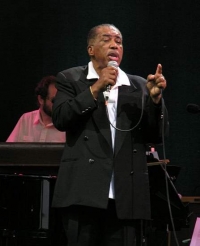
Ben E. King (born Benjamin Earl Nelson on September 28, 1938, in Henderson, North Carolina) became a famous soul singer of the 1960's. He is probably best known as the singer and co-composer of "Stand by Me," a U.S. top 10 hit in both 1961 and 1987 and a #1 hit in the UK in 1987, and as one of the principal lead singers of the legendary R&B vocal group, The Drifters.
Ahmet Ertegun once stated that King had one of the greatest voices in soul history. Throughout King's career he earned five number one hits, which were "There Goes My Baby", "Save The Last Dance For Me", "Stand By Me", "Supernatural Thing", and the 1986 re-issue of "Stand By Me". He also earned twelve Top 10 hits from 1959 to 1986.
Currently, King is active in his charitable foundation, the Stand By Me Foundation.
Ahmet Ertegun once stated that King had one of the greatest voices in soul history. Throughout King's career he earned five number one hits, which were "There Goes My Baby", "Save The Last Dance For Me", "Stand By Me", "Supernatural Thing", and the 1986 re-issue of "Stand By Me". He also earned twelve Top 10 hits from 1959 to 1986.
Currently, King is active in his charitable foundation, the Stand By Me Foundation.
John Mullen
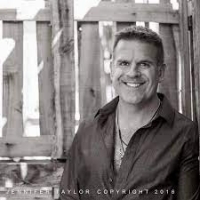
John Mullen As an experienced solo acoustic guitarist/singer/songwriter and a member of the Columbus Songwriter's.
David Dzubay

David Dzubay Musical composer Born: 1964 (age 58 years), Minneapolis, Minnesota, United States Awards: Guggenheim Fellowship for Creative Arts, US & Canada Songs Fanfares On Re For Ray Ray E. Cramer Retirement Concert · 2012
Capriccio, For Violin And Piano Dancesing In A Green Bay · 2010 Life Songs, Book II. Singing In The Sun: I Taste A Liquor Never Brewed Dancesing In A Green Bay · 2010.
Capriccio, For Violin And Piano Dancesing In A Green Bay · 2010 Life Songs, Book II. Singing In The Sun: I Taste A Liquor Never Brewed Dancesing In A Green Bay · 2010.
Peter J. Sullivan

By the late 1950s, Sullivan was working at the HMV record label as assistant to producer Wally Ridley. Ridley allowed Sullivan to take charge of recording sessions by a rock and roll group, Johnny Kidd and the Pirates, in 1960, and, working with engineer Malcolm Addey, Sullivan produced "Shakin' All Over", which became a hit single in the UK. Sullivan left HMV in 1962 and joined Decca Records as a producer. There, he produced records by Kathy Kirby, Lee Curtis and the All-Stars, The Swinging Blue Jeans, and Bern Elliott and the Fenmen, before discovering Scottish singer Lulu and producing her debut hit "Shout".
Gotye

Wouter "Wally" De Backer (born 21 May 1980), better known as Gotye (pronounced /ˈɡɔːti.eɪ/, or goh-tee-YAY), is a Belgian-Australian multi-instrumental musician and singer-songwriter. The name "Gotye" is a pronunciation respelling of "Gauthier", the French equivalent of the Flemish given name "Wouter".
Gotye has released three studio albums independently and one album featuring remixes of tracks from his first two albums. He is a member of the Melbourne indie-pop trio The Basics, who have independently released three studio albums and numerous other titles since 2002. His voice has been compared to those of Peter Gabriel and Sting. Gotye's 2011 single "Somebody That I Used to Know" reached number one on the Billboard Hot 100, making him the fifth Australian-based artist to do so and the second Belgian (after The Singing Nun in 1963). He has won five ARIA Awards and received a nomination for an MTV EMA for Best Asia and Pacific Act. On 10 February 2013, he won three Grammy Awards at the 55th Annual Grammy Awards Show: Record of the Year and Best Pop Duo/Group Performance for "Somebody That I Used to Know" and Best Alternative Music Album for Making Mirrors. Gotye has said he sometimes feels "less of a musician, more of a tinkerer."
Gotye is bilingual, speaking both Dutch and English, and also speaks some Japanese, which he studied at University.
Gotye has released three studio albums independently and one album featuring remixes of tracks from his first two albums. He is a member of the Melbourne indie-pop trio The Basics, who have independently released three studio albums and numerous other titles since 2002. His voice has been compared to those of Peter Gabriel and Sting. Gotye's 2011 single "Somebody That I Used to Know" reached number one on the Billboard Hot 100, making him the fifth Australian-based artist to do so and the second Belgian (after The Singing Nun in 1963). He has won five ARIA Awards and received a nomination for an MTV EMA for Best Asia and Pacific Act. On 10 February 2013, he won three Grammy Awards at the 55th Annual Grammy Awards Show: Record of the Year and Best Pop Duo/Group Performance for "Somebody That I Used to Know" and Best Alternative Music Album for Making Mirrors. Gotye has said he sometimes feels "less of a musician, more of a tinkerer."
Gotye is bilingual, speaking both Dutch and English, and also speaks some Japanese, which he studied at University.
Janis Ian
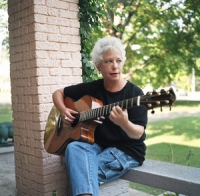
Janis Ian (born Janis Eddy Fink, April 7, 1951) is an American songwriter, singer, multi-instrumental musician, columnist, and science fiction fan-turned-author. She had a highly successful singing career in the 1960s and 1970s, and has continued recording into the 21st century. In 1975, Ian won a Grammy Award for her song, "At Seventeen".
Queen

Queen were an English rock band formed in 1970 in London by guitarist Brian May, lead vocalist Freddie Mercury, and drummer Roger Taylor, with bass guitarist John Deacon completing the lineup the following year. While it is uncertain how many albums the band has sold, estimations range from 130 million to over 300 million albums worldwide.
The band is noted for their musical diversity, multi-layered arrangements, vocal harmonies, and incorporation of audience participation into their live performances. Their 1985 Live Aid performance was voted the best live rock performance of all time in an industry poll.
Queen had moderate success in the early 1970s, with the albums Queen and Queen II, but it was with the release of Sheer Heart Attack in 1974 and A Night at the Opera the following year that the band gained international success. They have released fifteen studio albums, five live albums, and numerous compilation albums. Eighteen of these have reached number one on charts around the world.
Following Mercury's death in 1991 and Deacon's retirement later in the decade, May and Taylor have performed infrequently under the Queen name. Since 2005 they have been collaborating with Paul Rodgers, under the moniker Queen + Paul Rodgers.
The band is noted for their musical diversity, multi-layered arrangements, vocal harmonies, and incorporation of audience participation into their live performances. Their 1985 Live Aid performance was voted the best live rock performance of all time in an industry poll.
Queen had moderate success in the early 1970s, with the albums Queen and Queen II, but it was with the release of Sheer Heart Attack in 1974 and A Night at the Opera the following year that the band gained international success. They have released fifteen studio albums, five live albums, and numerous compilation albums. Eighteen of these have reached number one on charts around the world.
Following Mercury's death in 1991 and Deacon's retirement later in the decade, May and Taylor have performed infrequently under the Queen name. Since 2005 they have been collaborating with Paul Rodgers, under the moniker Queen + Paul Rodgers.
David Nevue

David Nevue is a solo piano composer and a pianist. He is the founder of Whisperings: Solo Piano Radio, an online radio station, as well as The Music Biz Academy, an educational web site for independent musicians. He is the author of the book, How to Promote Your Music Successfully on the Internet.
Edvard Grieg

Edvard Hagerup Grieg (15 June 1843 – 4 September 1907) was a Norwegian composer and pianist who composed in the Romantic period. He is best known for his Piano Concerto in A minor, for his incidental music to Henrik Ibsen's play Peer Gynt (which includes Morning Mood and In the Hall of the Mountain King), and for his collection of piano miniatures Lyric Pieces. "Edvard" is sometimes mispelt as "Edward".
Grieg is renowned as a nationalist composer, drawing inspiration from Norwegian folk music. Early works include a symphony (which he later suppressed) and a piano sonata. He also wrote three sonatas for violin and piano and a cello sonata. His many short pieces for piano — often based on Norwegian folk tunes and dances — led some to call him the "Chopin of the North".
Concerto in A minor: 1. Allegro molto moderato
Performed by the University of Washington Symphony, conducted by Peter Erős (Neal O'Doan, piano)
Concerto in A minor: 1. Allegro molto moderato
Performed by the Skidmore College Orchestra (courtesy of Musopen)
Concerto in A minor: 2. Adagio
Performed by the University of Washington Symphony, conducted by Peter Erős (Neal O'Doan, piano)
Concerto in A minor: 2. Adagio
Performed by the Skidmore College Orchestra (courtesy of Musopen)
Concerto in A minor: 3. Allegro moderato molto e marcato
Performed by the University of Washington Symphony, conducted by Peter Erős (Neal O'Doan, piano)
Concerto in A minor: 3. Allegro moderato molto e marcato
Performed by the Skidmore College Orchestra (courtesy of Musopen)
Notturno, Op. 54, No. 4
Performed live by Mark Gasser
Problems listening to these files? See media help.
The Piano Concerto is his most popular work. Its champions have included the pianist and composer Percy Grainger, a personal friend of Grieg who played the concerto frequently during his long career. An arrangement of part of the work made an iconic television comedy appearance in the 1971 Morecambe and Wise Show, conducted by André Previn.
Some of the Lyric Pieces (for piano) are also well-known, as is the incidental music to Henrik Ibsen's play Peer Gynt, a play that Grieg found to be an arduous work to score properly. In a 1874 letter to his friend Frants Beyer, Grieg expressed his unhappiness with what is now considered one of his most popular compositions from Peer Gynt, In the Hall of the Mountain King: "I have also written something for the scene in the hall of the mountain King - something that I literally can't bear listening to because it absolutely reeks of cow-pies, exaggerated Norwegian nationalism, and trollish self-satisfaction! But I have a hunch that the irony will be discernible."
Grieg is renowned as a nationalist composer, drawing inspiration from Norwegian folk music. Early works include a symphony (which he later suppressed) and a piano sonata. He also wrote three sonatas for violin and piano and a cello sonata. His many short pieces for piano — often based on Norwegian folk tunes and dances — led some to call him the "Chopin of the North".
Concerto in A minor: 1. Allegro molto moderato
Performed by the University of Washington Symphony, conducted by Peter Erős (Neal O'Doan, piano)
Concerto in A minor: 1. Allegro molto moderato
Performed by the Skidmore College Orchestra (courtesy of Musopen)
Concerto in A minor: 2. Adagio
Performed by the University of Washington Symphony, conducted by Peter Erős (Neal O'Doan, piano)
Concerto in A minor: 2. Adagio
Performed by the Skidmore College Orchestra (courtesy of Musopen)
Concerto in A minor: 3. Allegro moderato molto e marcato
Performed by the University of Washington Symphony, conducted by Peter Erős (Neal O'Doan, piano)
Concerto in A minor: 3. Allegro moderato molto e marcato
Performed by the Skidmore College Orchestra (courtesy of Musopen)
Notturno, Op. 54, No. 4
Performed live by Mark Gasser
Problems listening to these files? See media help.
The Piano Concerto is his most popular work. Its champions have included the pianist and composer Percy Grainger, a personal friend of Grieg who played the concerto frequently during his long career. An arrangement of part of the work made an iconic television comedy appearance in the 1971 Morecambe and Wise Show, conducted by André Previn.
Some of the Lyric Pieces (for piano) are also well-known, as is the incidental music to Henrik Ibsen's play Peer Gynt, a play that Grieg found to be an arduous work to score properly. In a 1874 letter to his friend Frants Beyer, Grieg expressed his unhappiness with what is now considered one of his most popular compositions from Peer Gynt, In the Hall of the Mountain King: "I have also written something for the scene in the hall of the mountain King - something that I literally can't bear listening to because it absolutely reeks of cow-pies, exaggerated Norwegian nationalism, and trollish self-satisfaction! But I have a hunch that the irony will be discernible."
Christian Wolff

Christian G. Wolff (born March 8, 1934) is an American composer of experimental classical music.Wolff was born in Nice, France, to the German literary publishers Helen and Kurt Wolff, who had published works by Franz Kafka, Robert Musil, and Walter Benjamin. After relocating to the U.S. in 1941, they helped to found Pantheon Books with other European intellectuals who had fled Europe during the rise of fascism. The Wolffs published a series of notable English translations of European literature, mostly, as well as an edition of the I Ching that came to greatly impress John Cage after Wolff had given him a copy.
Toshiro Masuda

Toshio Masuda (舛田 利雄 Masuda Toshio?, born October 5, 1927 in Kobe, Hyōgo, Japan) is a Japanese film director. He developed a reputation as a consistent box office hit-maker. Over the course of five decades, 16 of his films made the yearly top ten lists at the Japanese box office—a second place record in the industry. Between 1958 and 1968 he directed 52 films for the Nikkatsu Company. He was their top director of action films and worked with the company's top stars, including Yujiro Ishihara with whom he made 25 films. After the breakdown of the studio system, he moved on to a succession of big-budget movies including the American-Japanese co-production Tora! Tora! Tora! (1970) and the science fiction epic Catastrophe 1999: The Prophecies of Nostradamus (1974). He worked on such anime productions as the Space Battleship Yamato series. His corporate drama Company Funeral (1989) earned him a Japanese Academy Award nomination and wins at the Blue Ribbon Awards and Mainichi Film Awards. In Japan, his films are well remembered by fans and called genre landmarks by critics. He remains little known abroad save for rare exceptions of his post-Nikkatsu work such as Tora! Tora! Tora!. However, a number of his films were screened in a 2005 Nikkatsu Action Cinema retrospective in Italy and a few have since made their way to the United States. At the age of 81, he is currently prepping to helm Space Battleship Yamato: Rebirth (2009).
Renato Carosone

Renato Carosone, born Renato Carusone, was an Italian musician. He was a prominent figure of the Italian music scene in the second half of the 20th century. He was also a modern performer of the so-called canzone napoletana, Naples' song tradition
Erroll Garner
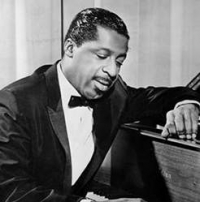
Erroll Louis Garner (June 15, 1921 – January 2, 1977) was an American jazz pianist and composer whose distinctive and melodic style brought him both popular acclaim and the admiration of peers. Of note, Garner was never able to read or write sheet music.
What makes Garner's playing easy to recognize is his trademark introductions, which seem to make no sense until breaking dramatically into his exposition of the tune he will play, and the guitar strumming sound of his left hand, playing crotchet accompaniment to his rich sounding right hand. He places his chords and octaves on syncopated beats that swing very hard and can be used to build excellent tension, such as between phrases. The approach also suggests he was influenced by the iconic rhythm guitar work of Count Basie's long time guitarist, Freddie Green. But discerning listeners could find that while his even four left hand was a fixture, it was far from being the only rhythmic approach he took to playing.
What makes Garner's playing easy to recognize is his trademark introductions, which seem to make no sense until breaking dramatically into his exposition of the tune he will play, and the guitar strumming sound of his left hand, playing crotchet accompaniment to his rich sounding right hand. He places his chords and octaves on syncopated beats that swing very hard and can be used to build excellent tension, such as between phrases. The approach also suggests he was influenced by the iconic rhythm guitar work of Count Basie's long time guitarist, Freddie Green. But discerning listeners could find that while his even four left hand was a fixture, it was far from being the only rhythmic approach he took to playing.
Jimi Hendrix
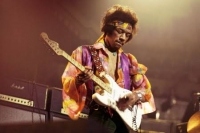
Johnny Allen "Jimi" Hendrix, American guitarist, guitar virtuoso, singer, songwriter and cultural icon. Hendrix is one of the most influential musicians in rock history. Hendrix, who first gained fame in the UK, became world famous after the Monterey Pop Festival in 1967
Real Book

The Real Book refers to compilations of lead sheets for jazz standards. It usually refers to the first volume of a series of books transcribed and collated by Berklee College of Music students during the 1970s.The name is derived from "fake books", so called because they contained only rough outlines of music pieces rather than fully notated scores. Early fake books were often used by professional bands who performed mostly standards, often more geared to society and dance bands rather than jazz ensembles, and devoted much space to show tunes, novelty tunes, traditional jazz, etc. The first three Real Book volumes, in contrast, contained many bebop and other jazz standards that were likely to be encountered on jazz gigs at the time. For this reason, the books were quickly adopted among jazz players in the 1970s, particularly on the east coast.
Ludwig van Beethoven

Ludwig van Beethoven (/ˈlʊdvɪɡ væn ˈbeɪt(h)oʊvən/ (About this soundlisten); German: (About this soundlisten); baptised 17 December 1770 – 26 March 1827) was a German composer and pianist. A crucial figure in the transition between the classical and romantic eras in classical music, he remains one of the most recognized and influential musicians of this period, and is considered to be one of the greatest composers of all time.
Beethoven was born in Bonn, the capital of the Electorate of Cologne, and part of the Holy Roman Empire. He displayed his musical talents at an early age and was vigorously taught by his father Johann van Beethoven, and was later taught by composer and conductor Christian Gottlob Neefe. At age 21, he moved to Vienna and studied composition with Joseph Haydn. Beethoven then gained a reputation as a virtuoso pianist, and was soon courted by Prince Lichnowsky for compositions, which resulted in Opus 1 in 1795.
Beethoven was born in Bonn, the capital of the Electorate of Cologne, and part of the Holy Roman Empire. He displayed his musical talents at an early age and was vigorously taught by his father Johann van Beethoven, and was later taught by composer and conductor Christian Gottlob Neefe. At age 21, he moved to Vienna and studied composition with Joseph Haydn. Beethoven then gained a reputation as a virtuoso pianist, and was soon courted by Prince Lichnowsky for compositions, which resulted in Opus 1 in 1795.
Lineu Soares

Lineu Soares in Piano from the São Judas Tadeu University (1988) and master in Music from the State University of Campinas (2012). He is currently a University Professor at the Adventist University Center of São Paulo.
Evanescence

Evanescence is an American rock band founded in Little Rock, Arkansas in 1995 by singer/pianist Amy Lee and guitarist Ben Moody.
After recording two private EPs and a demo CD named Origin, with the help of Bigwig Enterprises in 2000, the band released their first full-length album, Fallen, on Wind-up Records in 2003. Fallen sold more than 15 million copies worldwide and helped the band win two Grammy Awards. A year later, Evanescence released their first live album, Anywhere but Home, which sold more than one million copies worldwide. In 2006, the band released their second studio album, The Open Door, which has sold more than four million copies.
The band has suffered several line-up changes, including co-founder Moody leaving in 2003, followed by guitarist John LeCompt and drummer Rocky Gray in 2007. Lee is now the only original member of Evanescence remaining in the band.
After recording two private EPs and a demo CD named Origin, with the help of Bigwig Enterprises in 2000, the band released their first full-length album, Fallen, on Wind-up Records in 2003. Fallen sold more than 15 million copies worldwide and helped the band win two Grammy Awards. A year later, Evanescence released their first live album, Anywhere but Home, which sold more than one million copies worldwide. In 2006, the band released their second studio album, The Open Door, which has sold more than four million copies.
The band has suffered several line-up changes, including co-founder Moody leaving in 2003, followed by guitarist John LeCompt and drummer Rocky Gray in 2007. Lee is now the only original member of Evanescence remaining in the band.
U2

U2 are a rock band from Dublin, Ireland. The band consists of Bono (vocals and guitar), The Edge (guitar, keyboards, and vocals), Adam Clayton (bass guitar) and Larry Mullen, Jr. (drums and percussion).
The band formed in 1976 when the members were teenagers with limited musical proficiency. By the mid-1980s, however, the band had become a top international act, noted for their anthemic sound, Bono's impassioned vocals, and The Edge's textural guitar playing. Their success as a live act was greater than their success at selling records until their 1987 album The Joshua Tree increased the band's stature "from heroes to superstars," according to Rolling Stone. U2 responded to the dance and alternative rock revolutions, and their own sense of musical stagnation by reinventing themselves with their 1991 album Achtung Baby and the accompanying Zoo TV Tour. Similar experimentation continued for the rest of the 1990s. Since 2000, U2 have pursued a more traditional sound that retains the influence of their previous musical explorations.
U2 have sold more than 140 million albums worldwide and have won 22 Grammy Awards, more than any other band. In 2005, the band were inducted into the Rock and Roll Hall of Fame in their first year of eligibility. Rolling Stone magazine listed U2 at #22 in its list of the 100 greatest artists of all time. Throughout their career, as a band and as individuals, they have campaigned for human rights and social justice causes, including Amnesty International, the ONE Campaign, and Bono's DATA (Debt, AIDS, Trade in Africa) campaign.
The band formed in 1976 when the members were teenagers with limited musical proficiency. By the mid-1980s, however, the band had become a top international act, noted for their anthemic sound, Bono's impassioned vocals, and The Edge's textural guitar playing. Their success as a live act was greater than their success at selling records until their 1987 album The Joshua Tree increased the band's stature "from heroes to superstars," according to Rolling Stone. U2 responded to the dance and alternative rock revolutions, and their own sense of musical stagnation by reinventing themselves with their 1991 album Achtung Baby and the accompanying Zoo TV Tour. Similar experimentation continued for the rest of the 1990s. Since 2000, U2 have pursued a more traditional sound that retains the influence of their previous musical explorations.
U2 have sold more than 140 million albums worldwide and have won 22 Grammy Awards, more than any other band. In 2005, the band were inducted into the Rock and Roll Hall of Fame in their first year of eligibility. Rolling Stone magazine listed U2 at #22 in its list of the 100 greatest artists of all time. Throughout their career, as a band and as individuals, they have campaigned for human rights and social justice causes, including Amnesty International, the ONE Campaign, and Bono's DATA (Debt, AIDS, Trade in Africa) campaign.
 Sheet Music Max is a site for those who wants to access popular sheet music easily,
letting them download the sheet music for free for trial purposes.
It's completely free to download and try the listed sheet music, but you have to delete the files after 24 hours of trial.
Don't forget, if you like the piece of music you have just learned playing,
treat the artist with respect, and go buy the original sheet music.
Sheet Music Max is a site for those who wants to access popular sheet music easily,
letting them download the sheet music for free for trial purposes.
It's completely free to download and try the listed sheet music, but you have to delete the files after 24 hours of trial.
Don't forget, if you like the piece of music you have just learned playing,
treat the artist with respect, and go buy the original sheet music.
